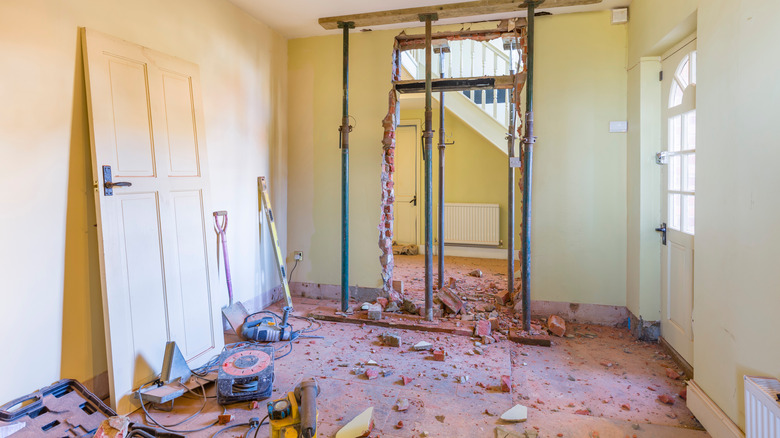Remodeling Expert's Tell-Tale Sign Your Wall Project Is About To Get Complicated
Taking on a home renovation project is challenging and rewarding. If you have the DIY mentality and some construction skills there is no reason why you can't accomplish most projects yourself. In fact, according to Fox Business, 74% of Americans say they feel confident overseeing projects. And with a little help and a lot of research, you can even take care of some remodeling on your own.
But just because knocking down a wall to open up the interior of your home looks simple in a Youtube video or on your favorite HGTV program doesn't mean it can't get complicated fast. That's why it helps to have the guidance of a professional. In an exclusive House Digest interview, we asked the owner of Ripped Jeans Construction, Jon Weist, to weigh in on what homeowners need to think about before taking on the project. "The main thing to consider before wall removal is whether that wall is load-bearing," Weist says, "Is the wall supporting the structures above it, be they floors or roofing? Without training, it can be difficult to know what to look for, but there are normally signs that show a professional which walls are load-bearing." He goes on to say that "Load-bearing walls can be reconfigured to be more open, but this will involve temporary bracing and rebuilding — not a small project. Typically, non-load-bearing walls are much easier to remove."
What you need before moving forward with finding a professional for your next wall project
If you get to the point in your home wall remodeling project where you have extended your DIY capabilities, then there is no shame in calling in the pros. The last thing you would want to do is cause irreversible damage to your home, which would surely increase the costs of the overall project. "Removing a wall really is something best left to a professional," expert Jon Weist tells us, "A contractor will be your best resource here."
When looking into hiring a properly licensed contractor, you are ideally getting someone with years of experience — and it may come with a few other bonuses as well. "Not only can they do the work, but they will have the connections to the permitting office and structural engineers where necessary," Weist mentions. "You may contact your local buildings department to discuss your project beforehand, or to find out if they have recommendations before you begin to interview contractors."
It may also be beneficial to talk to other homeowners who have tackled a similar project and find out if they have trusted professionals that they would recommend working with. Having first-hand experience with someone can be more insightful than a web page full of Google reviews. This way, you can get an accurate assessment of how they work and also see finished projects they have worked on themselves.
What should you look for when hiring a professional?
When seeking out help to start or finish your wall project, you should take the time to properly search for the best person for the job. Being patient with your selection process can also ensure that the job is done right, which will give you more peace of mind, plus hopefully add some value to your home. Expert Jon Weist gave us some insight on what to keep an eye out for when you're choosing a professional for the job. "Interviewing a contractor is really about trust," Weist tells us, "You want to ask questions that help you determine whether you can be confident with their work, and their interactions with you." Some of the things that he recommends you should ask the individual and even yourself are, "Do you trust this person in your home? Do they regularly pull permits for work that needs it? Will they protect your home while they work to minimize damage? Do they have an insurance policy that's up-to-date?"
It can also be wise to find out their qualifications and relevant references from other clients who have had similar work done. If possible, there's no harm in inquiring about an estimate of how much the job could cost and a rough time frame of when it can be completed. Weist also mentions that "Each building situation will result in different conversations, but the chief element needed is one of trust."


